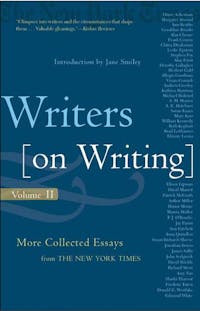Writers on Writing, Volume II
More Collected Essays from The New York Times
 Download image
Download image
ISBN10: 0805075887
ISBN13: 9780805075885
Trade Paperback
288 Pages
$21.00
CA$29.50
In the second volume of original essays drawn from the long-running New York Times column, Writers on Writing, Volume II brings together yet another remarkable group of celebrated writers to muse on the challenges and gifts of language and creativity.
Like the essays in Volume I, which were praised for their "overwhelming generosity of spirit," the essays here range from acerbic, hilarious advice for aspiring writers to thoughtful, soul-wrenching reflections on writing in the midst of tragedy. In an essay written only days after September 11, 2001, Mary Karr reminds us of literature's healing power, urging readers to turn to lyric poetry during such periods as it "dispenses more relief—if not actual salvation—during catastrophic times than perhaps any art form." Some, like Susan Isaacs, reveal that writers, like readers, can feel strong nostalgia for long-retired protagonists, so much so that "I didn't want to miss one word she said, or one second of her companionship. After all, who knows if she and I will ever meet again?" Many explore the tensions between fact and fiction, such as Anna Quindlen's discovery that "when I was writing about the people I actually met and the places I actually went, the enterprise was enshadowed by reader suspicion that we reporters made everything up. But when I made things up as a novelist, readers always suspected I was presenting a thinly disguised version of the facts of my own life." And in a pithy exercise, Elmore Leonard shares his most important rule for letting the writing, and not the writer, take charge: "If it sounds like writing, I rewrite it."
As Pulitzer Prize-winning novelist Jane Smiley notes in her introduction, "all these writers . . . give something away that perhaps they had never given away before, some item or craft or privacy or self-doubt." Always surprising, often inspiring, Writers on Writing offers revealing views of the writer's world.
Reviews
Praise for Writers on Writing, Volume II
"As tempting as it is for a writer to tell secrets, it is even more tempting to tell them in the New York Times. The forms of temptation abound: to join the company of other secret revealers, to get something off your chest, to impart a piece of wisdom that has resisted going into a novel or a poem, to cogently remember a time or an event. For a poet, I imagine there is the temptation to state rather than evoke. For a novelist, there is the temptation to stop dissembling. And so, this collection of Writers on Writing pieces is really a collection of temptations yielded to, a collection of secrets divulged in spite of what might happen . . . How to read this book? . . . Read it like eavesdropping or like twisting the knob on an old radio and tuning in stations from far and wide. Read it like an explorer, then wander among the authors' other works. Most of all, read it in a way that allows the varied voices of the company to come and go, to blend, to harmonize with and to echo one another, because it isn't often that forty-six authors sing in chorus."—From the Introduction by Jane Smiley
"Glimpses into writers and the circumstances that shape them . . . Valuable gleanings."—Kirkus Reviews
"In Jane Smiley's scintillating introduction to the second collection of columns from the exceptional New York Times series Writers on Writing, she piquantly observes that in writing about themselves and their art, writers both indulge the urge to tell secrets and battle the fear of disclosure, and this tension is, indeed, present in the two dozen essays that follow. Yet the overriding feeling is that of deep and abiding pleasure in putting thoughts into words and words onto paper. Here's Diane Ackerman marveling over the confluence of psychotherapy and poetry; Alan Cheuse pondering late bloomer-hood; and Leslie Epstein musing over writer's intuition. Allegra Goodman writes amusingly about outwitting the 'inner critic'; William Kennedy celebrates fiction and the 'metamorphosis of experience'; and Shashi Tharoor puzzles over his quandary as an Indian author writing about India in English. Why write, what about, for whom, and in whose voice are crucial concerns addressed by some of the finest living practitioners of this noble art, and readers will love being privy to their ruminations."—Donna Seaman, Booklist



